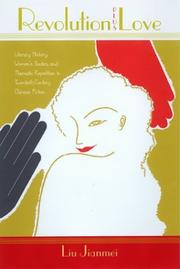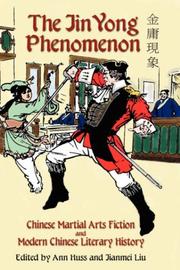| Listing 1 - 7 of 7 |
Sort by
|

ISBN: 0824825861 Year: 2003 Publisher: Honolulu University of Hawaii press
Abstract | Keywords | Export | Availability | Bookmark
 Loading...
Loading...Choose an application
- Reference Manager
- EndNote
- RefWorks (Direct export to RefWorks)
Book
ISBN: 0824843304 Year: 2003 Publisher: Honolulu : University of Hawaii Press,
Abstract | Keywords | Export | Availability | Bookmark
 Loading...
Loading...Choose an application
- Reference Manager
- EndNote
- RefWorks (Direct export to RefWorks)
In the aftermath of the May Fourth movement, a growing expectation of revolution raised important intellectual issues about the position of the individual within a society in turmoil and the shifting boundaries of political and sexual identities. The theme of "revolution plus love," a literary response to the widespread insurrections and upheaval, was first popularized in the late 1920s. In her examination of this popular but understudied literary formula, Liu Jianmei argues that revolution and love are culturally variable entities, their interplay a complex and constantly changing literary practice that is socially and historically determined.Liu looks at the formulary writing of "revolution plus love" from the 1930s to the 1970s as a case study of literary politics. Favored by leftist writers during the early period of revolutionary literature, it continued to influence mainstream Chinese literature up to the 1970s. By drawing a historical picture of the articulation and rearticulation of this theme, Liu shows how changes in revolutionary discourse force unpredictable representations of gender rules and power relations, and how women's bodies reveal the complex interactions between political representation and gender roles. Revolution Plus Love is a nuanced and carefully considered work on gender and modernity in China, unmatched in its broad use of literary resources. It will be of considerable interest to scholars and students of modern Chinese literature, women's studies, cultural studies, and comparative literature.
Book
ISBN: 9781604979466 Year: 2018 Publisher: Amherst Cambria Press
Abstract | Keywords | Export | Availability | Bookmark
 Loading...
Loading...Choose an application
- Reference Manager
- EndNote
- RefWorks (Direct export to RefWorks)

ISBN: 9781934043080 1934043087 Year: 2007 Publisher: Youngstown, N.Y. : Cambria Press,
Abstract | Keywords | Export | Availability | Bookmark
 Loading...
Loading...Choose an application
- Reference Manager
- EndNote
- RefWorks (Direct export to RefWorks)
Martial arts fiction, Chinese --- Chinese literature --- History and criticism. --- History and criticism. --- Jin, Yong, --- Criticism and interpretation.
Book
ISBN: 9780190238155 Year: 2016 Publisher: Oxford Oxford University Press
Abstract | Keywords | Export | Availability | Bookmark
 Loading...
Loading...Choose an application
- Reference Manager
- EndNote
- RefWorks (Direct export to RefWorks)
This is a powerful account of how the ruin and resurrection of Zhuangzi in modern China's literary history correspond to the rise and fall of modern Chinese individuality. Liu Jianmei highlights two central philosophical themes of Zhuangzi: the absolute spiritual freedom as presented in the chapter of "Free and Easy Wandering" and the rejection of absolute and fixed views on right and wrong as seen in the chapter of "On the Equality of Things." She argues the twentieth century reinterpretation and appropriation of these two important philosophical themes best testify to the dilemma and inner-struggle of modern Chinese intellectuals. In the cultural environment in which Chinese writers and scholars were working, the pursuit of individual freedom as well as the more tolerant and multifaceted cultural mentality has constantly been downplayed, suppressed, or criticized. By addressing a large number of modern Chinese writers, including Guo Moruo, Hu Shi, Lu Xun, Zhou Zuoren, Lin Yutang, Fei Ming, Liu Xiaofeng, Wang Zengqi, Han Shaogong, Ah Cheng, Yan Lianke, and Gao Xingjian, the author provides an insightful and engaging study of how they have embraced, rejected, and returned to ancient thought and how the spirit of Zhuangzi has illuminated their writing and thinking through the turbulent eras of modern China. This book not only explores modern Chinese writers' complicated relationship with "tradition," but also sheds light on if the freedom of independence, non-participation, and roaming and the more encompassing cultural space inspired by Zhuangzi's spirit were allowed to exist in the modern Chinese literary context. Involving the interplay between philosophy, literature, and history, Liu delineates a neglected literary tradition influenced by Zhuangzi and Daoism and traces its struggles to survive in modern and contemporary Chinese culture.
Book
ISBN: 9789004449121 9789004449114 Year: 2021 Publisher: Leiden Brill
Abstract | Keywords | Export | Availability | Bookmark
 Loading...
Loading...Choose an application
- Reference Manager
- EndNote
- RefWorks (Direct export to RefWorks)
Liu Zaifu 劉再復 is a name that has already been ingrained within contemporary Chinese literary history. This landmark volume presents Anglophone readers with Liu's profound reflections on Chinese literature and culture at different times. The essays collected here demonstrate Liu's historical experience and trajectory as an exiled Chinese intellectual who persistently safeguards the individuality and the autonomy of literature, refusing to succumb to political manipulation. Liu's theory of literary subjectivity has opened ways for Chinese writers to thrive and innovate. His panoramic view not only unravels the intricate interplay between literature and politics but also firmly regards the transcendental value of literature as a significant ground to subvert revolutionary dogmatism and criticize Chinese modernity. Rather than drawing upon the existing paradigm, he reinvents his own unique theoretical conceptions in order to exile the borrowed "gods.".
Chinese literature --- Literature --- History and criticism --- Theory, etc
Book
ISBN: 9004449124 Year: 2021 Publisher: Leiden, Netherlands ; Boston, Massachusetts : Brill,
Abstract | Keywords | Export | Availability | Bookmark
 Loading...
Loading...Choose an application
- Reference Manager
- EndNote
- RefWorks (Direct export to RefWorks)
"Liu Zaifu is a name that has already been ingrained within contemporary Chinese literary history. This landmark volume presents Anglophone readers with Liu's profound reflections on Chinese literature and culture at different times. The essays collected here demonstrate Liu's historical experience and trajectory as an exiled Chinese intellectual who persistently safeguards the individuality and the autonomy of literature, refusing to succumb to political manipulation. Liu's theory of literary subjectivity has opened ways for Chinese writers to thrive and innovate. His panoramic view not only unravels the intricate interplay between literature and politics but also firmly regards the transcendental value of literature as a significant ground to subvert revolutionary dogmatism and criticize Chinese modernity. Rather than drawing upon the existing paradigm, he reinvents his own unique theoretical conceptions in order to exile the borrowed "gods.""--
Chinese literature --- Literature --- History and criticism. --- History and criticism --- Theory, etc.
| Listing 1 - 7 of 7 |
Sort by
|

 Search
Search Feedback
Feedback About UniCat
About UniCat  Help
Help News
News